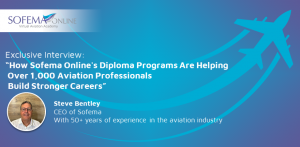Sofema Online Diploma Programs Contribute to the Career Progression of Over 1,000 Aviation Professionals Globally
Steve Bentley reflects on the evolution of Sofema Оnline ’s structured learning paths as Diploma Programs surpass 1,000 global enrolments in aviation training.
SOFIA , BULGARIA , BULGARIA, April 24, 2025 /EINPresswire.com/ -- Steve Bentley, FRAeS and CEO of Sofema Group, Reflects on 1,000+ Enrollments in Sofema Online’s Diploma ProgramsQ: Steve, congratulations on reaching over 1,000 enrolments in Sofema’s Diploma Programs. Can you take us back to the beginning - how did Sofema get started in 2008?
Steve Bentley: Sofema Aviation Services was founded in 2008 with a clear mission: to deliver professional, industry-relevant training that supports regulatory compliance and strengthens competence across the aviation sector. The initial focus was on classroom-based courses covering EASA regulations. The industry’s response was positive, appreciating the real-world, practical approach grounded in operational experience.
As the training needs of the aviation industry evolved, the opportunity to expand into online learning became evident. In 2013, Sofema Online (SOL) was launched to provide professionals with flexible access to high-quality aviation training.
Q: What inspired the creation of the Diploma Programs?
Steve Bentley: Many clients were not only completing individual courses but were actively building knowledge across multiple domains such as CAMO, AMO, Safety Management Systems, and Quality & Auditing. This trend indicated a need for structured learning paths.
In response, structured Diploma Programs were developed. These consist of up to 15 specialized courses grouped by professional focus. The intention was to offer more than isolated training—each program is designed to support long-term professional development within the aviation industry.
Q: Who are the Diploma Programs designed for?
Steve Bentley: The programs serve a broad professional audience. This includes engineers transitioning into management roles and professionals in CAMO and Quality Assurance roles seeking deeper regulatory knowledge. Most participants are mid-career professionals aiming to strengthen their competence and advance their careers. The programs support knowledge in critical regulatory areas including SMS, Human Factors, Part 145, Part M, and Part CAMO.
Q: How do the programs contribute to competence-building in practice?
Steve Bentley: Each Diploma delivers between 12 and 18 days of focused learning through flexible, self-paced modules. These are advanced courses, developed by subject matter experts with decades of industry experience. The training content includes real-world case studies, practical examples, and problem-solving exercises. The goal is to develop a well-rounded skillset that enhances both professional confidence and operational performance.
Q: What kind of feedback has been received from Diploma graduates?
Steve Bentley: Feedback has been consistently positive. Graduates frequently report that the programs have contributed to career advancement, including promotions, role transitions, and improved job performance. The Diplomas are increasingly seen as a valuable indicator of professional competence and regulatory knowledge. A growing number of companies are now incorporating the Diplomas into their internal training and development strategies.
Q: What’s next for Sofema’s Diploma Programs?
Steve Bentley: The programs continue to evolve based on participant feedback. New Diplomas have been introduced in areas such as Reliability, Stores & Logistics, Regulatory Affairs, and SMS for Safety Professionals. Development is also underway for “Diploma Plus” formats, incorporating workshop-based assessments and analytical tools that align with long-term career development objectives. Competent professionals remain essential to the future of aviation, and the goal is to ensure the training remains relevant, effective, and accessible.
Q: Any final thoughts for someone considering a Sofema Diploma?
Steve Bentley: The programs аре an opportunity to gain regulatory knowledge and strengthen competence in critical operational areas. They are structured to support professional development and help individuals demonstrate their capabilities within a competitive industry.
Steve Bentley
Sofema Online
team|sassofia.com| |team|sassofia.com
Visit us on social media:
LinkedIn
Facebook
YouTube
Legal Disclaimer:
EIN Presswire provides this news content "as is" without warranty of any kind. We do not accept any responsibility or liability for the accuracy, content, images, videos, licenses, completeness, legality, or reliability of the information contained in this article. If you have any complaints or copyright issues related to this article, kindly contact the author above.
Black Veteran's Memoir 'The Black Trump Supporter' Ignites National Dialogue on Politics and Identity
Puente & Sons Funeral Chapels Continues To Provide Affordable Funeral and Cremation Services to San Antonio Families
10 Most Expensive Cities 2025: Baboo Travel's Tips to Navigate Luxury Trips Worldwide
Kalendarium
Więcej ważnych informacji
 Jedynka Newserii
Jedynka Newserii

 Jedynka Newserii
Jedynka Newserii

Prawo

Duże możliwości korzystania z funduszy europejskich przez polskie firmy. Szczególnie w obszarze obronności
W ramach polityki spójności i Krajowego Planu Odbudowy Polska ma do dyspozycji 190 mld zł na wsparcie polskich firm. Środków dla przedsiębiorców nie zabraknie również w nowej perspektywie finansowej po 2027 roku. Dedykowane im programy KPO obejmują nie tylko wsparcie finansowe, ale również inwestycje i reformy deregulujące polską gospodarkę. Ich celem jest zwiększenie jej konkurencyjności, jak również bezpieczeństwa w kontekście położenia geopolitycznego Polski. Na szczególnie szeroką ofertę programów mogą liczyć sektory obronności i transportowy.
Farmacja
Zniesienie zakazu reklamy aptek może zwiększyć świadomość pacjentów o usługach farmaceutycznych. Taki może być skutek wyroku TSUE

W czerwcu Trybunał Sprawiedliwości Unii Europejskiej uznał, że obowiązujący w Polsce całkowity zakaz reklamy aptek narusza prawo UE. To oznacza, że Polska będzie musiała dostosować regulacje. Dla pacjentów wyrok oznacza szerszy dostęp do informacji o usługach farmaceutycznych, a dla właścicieli aptek – możliwość legalnej komunikacji z rynkiem. Naczelna Rada Aptekarska obawia się chaosu prawnego i wezwała resort zdrowia do uregulowania sytuacji prawnej.
Prawo
Przemysł chemiczny czeka na szczegóły unijnego wsparcia dla sektora. Najważniejsza jest obniżka cen energii

Komisja Europejska przedstawiła plan działania dla modernizacji i wzmocnienia konkurencyjności unijnego przemysłu chemicznego. Plan ma być rozwiązaniem najważniejszych wyzwań stojących przed sektorem chemicznym w Europie, w tym m.in. wysokich cen energii i nieuczciwej konkurencji na rynkach zagranicznych. KE chce również promować inwestycje w innowacje, ESG, a także uprościć unijne przepisy dotyczące chemikaliów.
Partner serwisu
Szkolenia

Akademia Newserii
Akademia Newserii to projekt, w ramach którego najlepsi polscy dziennikarze biznesowi, giełdowi oraz lifestylowi, a także szkoleniowcy z wieloletnim doświadczeniem dzielą się swoją wiedzą nt. pracy z mediami.









.gif)

 |
| |
| |
|